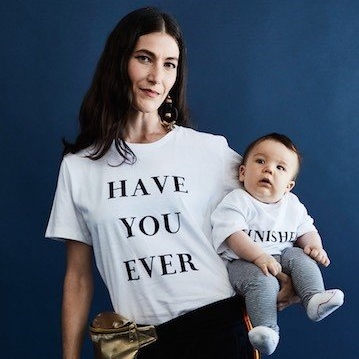
SA

Creating a ‘new normal’ for mothers
TALI FEINBERG
We see this in our own community, as women use the Joburg Jewish Mommies and Cape Town Jewish Mommies groups as a reliable resource to find everything from a plumber to a school. Then there is The Village, begun by Jewish mom Vanessa Raphaely, which allows parents to bare their souls and find solutions as they raise teenagers.
This emotional support is one way that social media can be really powerful. When Genevieve Putter suffered panic attacks and depression after the birth of her son three years ago, she felt “unbelievably let down that no one was upfront with me, or warned me when I was pregnant that I was a prime candidate for a peri-natal anxiety and mood disorder”.
These terms broaden the diagnosis beyond the traditional post-natal depression, including women who suffer mood issues well into the first few years of motherhood. According to Putter, one in three women in South Africa suffers from this condition, but it is rarely discussed by medical professionals or antenatal classes.
After recovering from the challenges she faced in early motherhood, Putter felt it was time to bring this reality into the open. Amidst airbrushed pictures and styled flat-lays on Instagram, her platform would be different: it would create awareness that early motherhood was anything but pretty, and encourage others to seek support in the early days with a newborn.
“I called it ‘The New Normal’, because it was about a new way of being after becoming a mother, and how everything changes.” The response was instantaneous – every day, more mothers from around the country and around the world liked the page on Instagram, which currently has more than 3 000 followers.
The page covers everything from the guilt of moms grieving for their old lives, the need for a “village” of support, the challenges of working mothers, hormonal changes, physical changes, and mental health. In between, there is humour, joy, and comfort – a truly welcoming space for mothers.
Putter has used social media in practical ways, hosting online discussions where women can share their thoughts and experiences anonymously, or connecting mothers living in the same area. “Every day, I get messages from women asking for support,” she says.
While it’s a challenge, it remains her passion. It’s the reason for her shifting from her career as a content creator to training as a post-partum doula. In this role, she will be able to continue the work she began on the web, and help mothers in their homes.
“In most first-world countries, women get free visits from healthcare professionals in the weeks after the birth, but we don’t have that here,” she says. South African women are therefore in desperate need of post-partum support.
While social media is the foundation of this community, Putter has also taken it into the real world. The New Normal hosts support groups for mothers in Cape Town, and talks by professionals. Putter has also teamed up with psychologist Carly Abramowitz to create an antenatal curriculum on post-birth mental health for mothers, to be presented with the usual classes on birth and baby at antenatal clinics in Cape Town.
Putter says there is a great demand for The New Normal to expand these experiences to Johannesburg, and this is definitely part of the plan. Her ultimate vision, inspired by the book The Red Tent, is the creation of a women’s health centre.
“It would cater for all seasons of a woman’s life cycle, from puberty to menopause,” she says. She is currently looking for a patron or investor to support this dream.
To fellow Jewish moms, Putter advises, “draw on the community for support, and be open about your needs”. She believes Jewish women of the older generation need to be more honest with young mothers about the challenges they may face. Asking a new mom if she is “loving” motherhood does nothing to offer real support, but an honest conversation can make a real difference.
“What I’ve learnt on this journey is that being vulnerable and authentic is one of the biggest strengths we can tap into,” says Putter. “We think we can ‘have it all’, but often, something’s got to give. If we’re okay with that, we’ll have a much easier time as women and mothers.”




